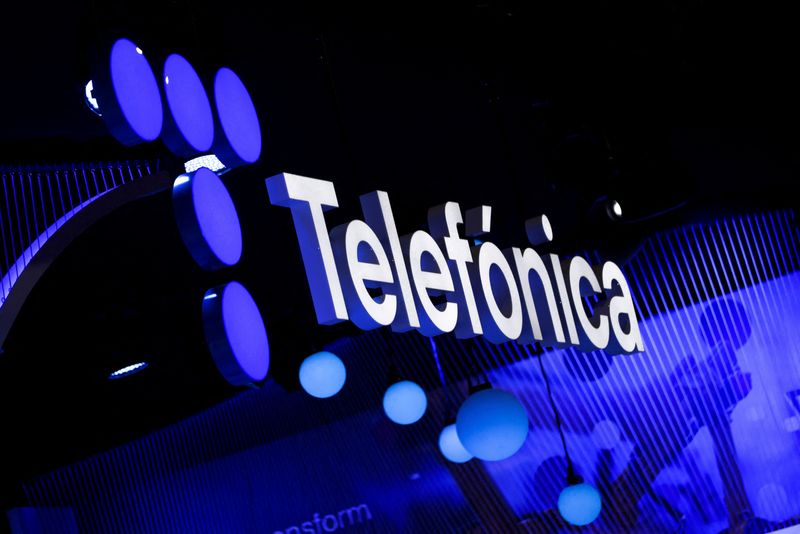By Emma Pinedo and Belén Carreño
MADRID (Reuters) -Spain is analysing Saudi Arabian group STC's purchase of a 9.9% stake in Telefonica (NYSE:TEF) , signalling a potential hurdle to the move, in order to ensure that its strategic interests are upheld.
STC had contacted the Spanish government on Tuesday to inform it of the deal, which would make STC the Spanish telecom's largest shareholder, acting economy minister Nadia Calvino said in Brussels on Wednesday.
"Telefonica is a strategic company for our country and as government we will apply all the mechanisms that are necessary to prioritise the defence of our strategic interests," Calvino told reporters when asked about STC's move.
Madrid could potentially stymie STC's stake purchase since Telefonica provides services to Spain's defence industry and the government can intervene in acquisitions of holdings above 5%.
An official familiar with the government's thinking said Madrid will "exercise its power" to approve or reject the operation as it understands it has oversight authority due to Telefonica's links to national defence.
Acting Social Rights Minister Ione Belarra, who belongs to the government's hard-left coalition partner Podemos, said on X - formerly Twitter - that "public control of strategic companies is a matter of urgency from a democratic and security point of view."
Belarra added that state holding company SEPI should acquire a 10% stake in Telefonica over the next few years to "lead digitalisation."
Trade union UGT welcomed STC's move in a statement, describing it as "a capital inflow that consolidates everything that has to do with the company's future investments ... which will guarantee the future of its workers."
However, Spain's biggest union CCOO urged "caution and responsibility," vowing to remain vigilant of STC's next actions.
STC on Tuesday said it had built a 9.9% stake in Telefonica worth 2.1 billion euros ($2.25 billion), following the playbook of other Middle Eastern companies in investing in European and Latin American telecom operators.
STC is Saudi Arabia's largest telecoms operator and is 64% owned by Saudi Arabia's Public Investment Fund (PIF), the main engine of Crown Prince Mohammed bin Salman's Vision 2030 to wean the economy off its dependence on oil.
European telecom firms such as Telefonica meanwhile have been struggling to pay off huge debts in the face of slow-growing mobile business and high investments for latest technologies such as 5G.
They have tried to raise funds by selling off their tower businesses, lobbied the European Commission to allow for market consolidation and have been fighting with technology companies to get them to fund infrastructure investments.
Telefonica's total debt is close to twice its market value of almost 22 billion euros.
"This provides a much-needed boost for Telefonica given the huge investment to roll out fibre broadband 5G in key core markets," said Paolo Pescatore, an analyst at PP Foresight.
There will now be opportunities for both companies to work more closely to bring greater efficiencies and launch new products globally, he said.
The government introduced legislation to block acquisitions of stakes of 10% or more in listed companies by entities from outside the European Union and European Free Trade Association to try to prevent hostile takeovers of companies whose values have plummeted since the COVID-19 pandemic.
The threshold at which the government can intervene was recently lowered to 5% for companies related to defence.
Calvino said Madrid was analysing the application of the relevant defence mechanisms, the sector, its relation with Spain's security and defence of Spain, STC's shareholding, the exercise of voting rights and the participation on the board or other decision-making bodies of the company.
"Fortunately, since we arrived in government we have reinforced the mechanisms for protecting our strategic interests," Calvino added.
Telefonica is listed as a defence provider on government websites, supplying "systems and equipment" to the army and satellite services to the defence ministry's aerospace arm.
HUAWEI LINK
A Spanish government source also pointed to potential concerns over STC's relationship with telecommunications giant Huawei Technologies, including a recent Memorandum of Understanding between the two to develop fibre-optic broadband.
Information technology has been a sticking point for China's relations with the United States and European countries, which have in some cases banned Chinese products for security reasons.
Spain is not among the 10 EU countries that have banned Huawei and ZTE (HK:0763) from their 5G telecoms networks but EU pressure is growing on all member states to do so.
Neither STC nor Telefonica responded to requests for comment about Huawei's work with STC. Huawei, ZTE and Beijing have rejected Western allegations that Chinese equipment might be used for spying.

Telefonica, whose shares rose 2% on Wednesday on the Madrid stock exchange, said it was informed of STC's investment on Tuesday, describing it as "friendly."
STC's holding consists of 4.9% of Telefonica's shares and financial instruments that give it another 5% in so-called economic exposure to the company. It said it plans to secure voting rights for that 5% interest held through financial instruments after receiving regulatory approvals.